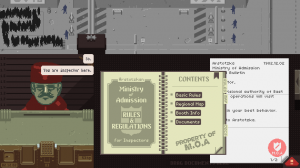The depiction of bureaucracy in Papers, Please reflects the ideas of Max Weber. Glory to Arstotzka!
In his article, Glory to Arstotzka: Morality, Rationality, and the Iron Cage of Bureaucracy in Papers, Please, Jason J. Morrissette discusses the aspects of bureaucracy and related moral issues in the 2013 puzzle game Papers, Please. Morrissette states that the theme of bureaucracy is one that has not been explored to great lengths in video games. While Papers, Please is not the only game that has done this, it is perhaps the most prominent one. Morrissette also states that the game very successfully captures the nature of bureaucracy in a way that reflects the thoughts of the German sociologist, Max Weber. Morrissette chose Weber’s perspective for his article because of Weber’s status as a pioneer in the field of sociology and because his works remain highly influential.
The ideas and theories of Weber are central to Morrissette’s article. The most important concept originating from Weber is the iron cage. The bureaucracy of modern states are fundamentally dehumanizing systems, aiming for absolute objectivity in decision-making. According to Weber, even though these systems are essential to modern societies, they also end up imprisoning them into an “iron cage”. The idea of the iron cage represents a disenchanted world were traditional interpersonal ties between people have been replaced with rationalization and cold intellect.
Morrissette states that there are three major elements in Papers, Please that create the feel of a bureaucratic state and the iron cage: firstly, the paperwork of the game reflects Weber’s ideas about modern bureaucracy. Secondly, both the mechanics and the aesthetics aim to capture the monotony of the iron cage. And thirdly, the moral dilemmas that the players face when playing the game reflect the tensions present in depersonalized administrative systems.
In Economy and Society, Weber lists six characteristics of modern bureaucracies:
-
-
-
Bureaucratic agencies operate within a fixed jurisdictional area.
-
Bureaucratic duties are carried out based on office hierarchy (there is a clear chain of command).
-
The management of bureaucratic agencies is based on written documents.
-
Office management usually requires specialized training for the officers.
-
Bureaucratic activities demand the full working capacity of the official.
-
The bureaucratic office follows general rules, which are usually stable. The officers are expected to follow the rules in all cases.
-
-
Morrissette states that the bureaucratic system depicted in Papers, Please displays most of these six characteristics. The border checkpoint where the protagonist works operates in a clearly defined jurisdictional area: processing people trying to enter Arstotzka. The checkpoint has a clear chain of command, demonstrated by the visits by the protagonist’s supervisor, Dimitri. All activities that the player has to do are based on official documents and rules, and the system expects the protagonist to obey these rules. The tasks of the protagonist also demands his full capacity, as the player tries to process as many people as possible each day. This aspect is further emphasized by the fact that the game shows very little of the protagonist’s life outside of his work.
Morrissette claims that the game’s repetitive, even boring nature (every day is similar to the previous one) actually works in its advantage, enhancing the oppressive and dull atmosphere of the game’s world. The music and the art style add to this bleak world, with purposely primitive, bleak graphics and a soundtrack with only a single song, the national anthem of Arstotzka. Morrissette argues that the repetitive mechanics and bleak aesthetics style of the game reinforce each other, simulating Weber’s iron cage.
The game also features moral choices for the player, where they must choose whether to follow the rules or not in specific cases (for example, should a person in need of a life-saving medical operation be allowed entry without proper documentations). Morrissette argues that while the game shows that it is possible to break free from the iron cage, there is a price to be paid: out of the 20 possible endings to the game, the protagonist remains alive and free in only six of them. Also, if the player obeys the rules through the game, he or she can unlock Endless mode, effectively trapping the protagonist into the iron cage forever.
To summarize, Morrissette’s analysis of Papers, Please showcases that the game’s bureaucracy is closely related to Weber’s ideas about the subject. Especially the concept of the iron cage is created through gameplay, aesthetics and narrative. The player is put in the position of the bureaucrat, and it is up to them to decide whether to stay in the iron cage or try to break free.

The bleak world of the bureaucrat. Picture taken from the official Papers, Please site at http://papersplea.se/
Key information:
Original Article: Glory to Arstotzka: Morality, Rationality, and the Iron Cage of Bureaucracy in Papers, Please
Author: Jason J. Morrissette
Published: Game Studies, volume 17, issue 1, July 2017
Original article accessible from http://gamestudies.org/1701/articles/morrissette
You might also like
More from Game Research Highlights
How do you want to do this? – A look into the therapeutic uses of role-playing games
Can playing RPGs contribute positively to your wellbeing? A recent study aims to find out how RPGs are being used …
Eldritch horrors and tentacles – Defining what “Lovecraftian” is in games
H.P. Lovecrafts legacy lives today in the shared world of Cthulhu Mythos and its iconic monsters. Prema Arasu defines the …
Are Souls Games the Contemporary Myths?
Dom Ford’s Approaching FromSoftware’s Souls Games as Myth reveals the Souls series as a modern mythology where gods fall, desires …















